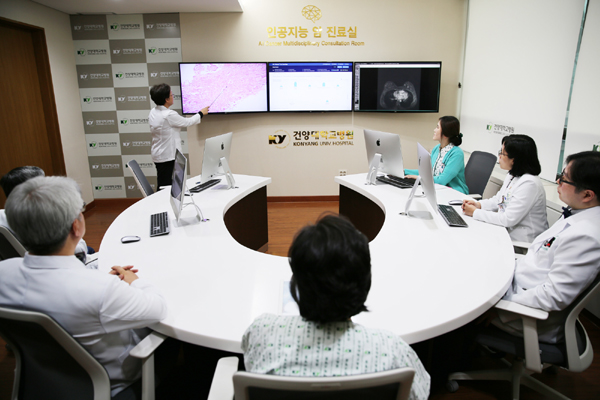Ministry makes guidelines on approving Big Data, AI-using medical device
The Ministry of Food and Drug Safety said on Thursday that IBM’s artificial intelligence-based software “Watson for Oncology” to help diagnose and treat cancer cannot be considered as a medical device. The government’s official stance came one year after local hospitals adopted Watson.
Announcing new guidelines for review and assessment of medical device that use medical Big Data and AI technologies, the ministry said Watson was not a medical device.
The government has been working out the new guidelines to decide the criteria for distinguishing the medical device from the non-medical device, amid a rapid growth of AI and deep learning technologies and a blurred line among medical Big Data and AI-using software programs.
Kores is the world’s first to have come up with such guidelines for an approval of Big Data and AI-using software. To establish the guidelines, the ministry worked with 21 experts from the medical community, academic circles, and businesses for more than a year.

According to the guidelines, IBM’s Watson is not a medical device because it searches academic papers to recommend treatments. On the other hand, VunoMed, being developed by local startup Vuno specialized in deep learning, is considered a medical device because the software can help doctors diagnose diseases such as lung cancer by learning medical images including computed tomography (CT) and magnetic resonance imaging (MRI) data.
The difference between Watson and VunoMed is whether the program can directly diagnose a disease and suggest a proper treatment. While VunoMed reads the patient’s CT and MRI images and diagnoses a lung cancer, Watson searches for treatments and make suggestions only after a doctor makes a diagnosis of lung cancer.
“What Watson searches for is research papers and international Golden Standard. In a big picture, Watson is another medical paper. The patient’s data in Watson comes from a doctor’s confirmed diagnosis. So, it is not medical device because it is only searching for optimal treatments. This is why the medical community calls Watson ‘another good text’,” said Cho Yang-ha, director of the medical device evaluation department at the National Institute of Food and Drug Safety Evaluation.
“If Watson further develops and gets to diagnose, treat, or prevent a disease, we may discuss changing the guidelines,” he added.
Software programs that meet the guidelines for an approval of medical device include products that analyzes data to automatically diagnose or predict a patient’s disease and status, and treat the disease, and products that examines body signals and their patterns such as brainwaves electrocardiogram through medical imaging device and signal-catching system, and offers information for diagnosis and treatment of a disease.
Those not meeting the guidelines for medical device are under five categories: products that support administrative works for medical institutions such as collecting insurance documents; products that support health management in sports, leisure, and daily life; products used for the purpose of education and research at universities and research labs; and products that help medical workers easily find useful information for patients out of medical information such as papers, guidelines, and prescription lists.
Products currently not considered as a medical device can be approved later as a medical device if they go through reviews on product development status in and out of Korea, related data search and analysis, the regulators’ monitoring, and a collection of expert opinions.

